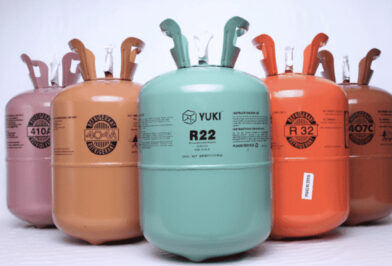The HVAC industry is ever-changing and increasingly complex, leaving HVAC technician jobs in high demand. According to the Bureau of Labor Statistics, HVAC is expected to grow 5% over the next ten years. To keep up with the demand, HVAC licenses in Connecticut will be vital.
Becoming an expert in this trade will help provide job security, competitive pay, and enhanced skills. For those considering pursuing an HVAC license in Connecticut, there are some requirements to follow.
Meeting the Criteria
To work in the state of Connecticut on heating systems, cooling and air-conditioning units, refrigeration systems, ductwork, or hearth products, it’s crucial to hold an HVAC/R license.
This covers a broad spectrum, including air conditioners, central air, ductless cooling systems, boilers, fireplaces, chimneys, gas heating systems, ductwork, hoods, freezers, refrigeration appliances, and commercial refrigeration systems.
In Connecticut, licensed contractors possess the authority to conduct a comprehensive range of tasks within their specialized areas. This encompasses everything from designing and installing to maintaining, repairing, and replacing various systems and equipment.
Every state in the US is also required to abide by federal-level EPA regulations under Section 608 of the Clean Air Act. All contractors who handle refrigerants must acquire a 608 HVAC Certification.
What are the different types of HVAC licenses in New Jersey?
Three main types of HVAC licenses can be obtained in Connecticut, as well as 20 specialty licenses with different job training and requirements.
Apprentice
An apprentice license requires Connecticut HVAC technicians to enroll in a four-year course completing 720 hours of instruction and 8,000 hours of on-the-job training.
This type of license begins with an S-2 qualification. It will require you to obtain a permit from the Connecticut Department of Consumer Protection and register with the Connecticut Office of Apprenticeship Training.
Apprentices can only work under the supervision of a licensed journeyperson or contractor.
Journeyperson
To become a Connecticut HVAC journeyperson, applicants must complete a registered apprenticeship program, then pass a licensing exam. They then have to work under a licensed HVAC contractor.
A journeyperson can obtain two different licenses: limited or unlimited. A limited license only allows for work in one specific area of the industry, while those who have an unlimited license can work in any area of the industry.
Additionally, a Connecticut HVAC journeyperson can obtain ten different specialty licenses:
- S-2 Unlimited Heating, Piping, and Cooling Journeyperson
- S-4 Limited Heating, Cooling, and Piping Journeyperson
- S-6 Limited Heating, Hot Water, and Steam Journeyperson
- S-8 Limited Journeyperson
- S-10 Limited Heating Cooling Journeyperson
- B-2 Limited Gas and Oil Burner Journeyperson
- B-4 Limited Gas and Oil Burner Journeyperson
- D-2 Limited Warm Air, Air Conditioning, and Refrigeration Journeyperson
- D-4 Limited Cooling Journeyperson
- G-2 Limited Heating, Piping, and Cooling Journeyperson
- Contractor
Contractor
To become a Connecticut HVAC contractor, you must first complete two years of journeyperson work and pass three exams; trade, business, and law. Contractors can employ journeypersons and apprentices and offer an array of work, including installation, repair, cooling, piping, maintenance of heating, and sheet metal work.
Contractors can obtain a limited license, which restricts them to a specific area of the industry, or an unlimited license which allows them to work in any area of the industry.
Additionally, a Connecticut HVAC contractor can obtain ten different specialty licenses:
- S-1 Unlimited Heating, Piping, and Cooling Contractor License
- S-3 Limited Piping, Cooling, and Heating Contractor License
- S-5 Limited Heating, Steam Contractor, and Hot Water License
- S-7 Limited Contractor License
- S-9 Limited Heating Cooling Contractor License
- B-1 Limited Gas and Oil Burner Contractor License
- B-3 Limited Gas and Oil Burner Contractor License
- D-1 Limited Refrigeration Contractor, Warm Air and Air Conditioning License
- D-3 Limited Cooling Contractor License
- G-1 Limited Cooling, Heating, and Piping Contractor License
Benefits of Getting an HVAC License in Connecticut
The Bureau of Labor Statistics projects an average of more than 40,000 job openings in the HVACR industry each year, over the decade.
Many are expected simply from the need to replace workers who transfer to different occupations or exit the labor force. The rise in commercial and residential building construction will increase the number of sophisticated climate-control systems, driving employment growth.
Additionally, the significance placed on energy efficiency and pollution reduction is likely to increase the demand for HVACR technicians as climate-control systems are retrofitted, upgraded, or replaced entirely.
Along with the ever-growing demand for professionals in the HVACR industry, there are several benefits to becoming a licensed HVACR technician in Connecticut, including:
- Increased Salary
- Enhanced Skills
- Further your Education
- Grow your Expertise
- Obtain more Advanced Licenses
HVAC License Fees in Connecticut
An application fee for an HVAC journeyperson in Connecticut is $90, while the initial license fee of $120 is due after passing the exam.
For an HVAC contractor in Connecticut, both the application fee and licensing fee (after successfully passing the exam) are $150. All HVAC licenses expire on August 31st every year and require a renewal fee of $120 for a journeyperson and $150 for a contractor.
In addition to licensing costs, HVAC professionals must also consider insurance costs. Connecticut requires all businesses with at least one employee to carry workers’ compensation insurance. This will help cover injuries and accidents while on the job, all of which are plausible in the HVAC industry.
Liability insurance is also highly recommended, even though not required, which will help cover property damage and injuries on the job site. Customers are also more inclined to choose an HVAC contractor who’s fully insured and licensed.
Final Thoughts
As the HVACR industry continues to become more complex and in demand, it’s no wonder employment is highly sought after. Earning a license in the field comes with many benefits and career opportunities, especially in Connecticut.
It’s essential to understand the requirements of becoming a certified HVAC technician and ensure you safely and efficiently define your role in the competitive industry.




